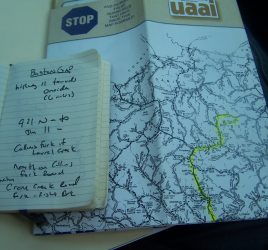From The Dickey Diaries: On Class, Fortunes, and Feuds in Appalachia
The Reverend John Jay Dickey was a traveling minister who spent a good deal of time both chronicling his journeys through the mountains of early America and his attempts to set up churches in schools in towns. The Dickey Diaries paint an amazingly clear picture of the daily life (and frustrations) he observed.
Each time I visit Manchester, I spend some time going through the diaries, transcribing interesting tidbits, and immersing myself in his world. On this last visit, I tried to focus on two elements: his work establishing a local school system throughout Laurel, Clay, and Owsley counties, and his changing perception of the people of Clay County. What follows are excerpts that focus on the latter.
First Impressions
“Some came, especially those who located along the Wilderness Road, to make money keeping public house, so great was the travel, as John Jackson, Wm. McKee, and John Freeman and Richard Pittman, in Laurel County. I believe that the principals in all the feudal wars can be traced to honorable ancestry.” — December 21, 1895, London, KY (p. 1595)
Dickey struggled with his perception and understanding of the people in the tri-county region. On one hand, he recognized that many of these folks came from the upper and middle classes; on the other, he couldn’t understand how such people could engage in violent behavior.
Early on in his tenure, he wrote that religion would be the element that ended the bloodshed in Clay County. The longer he stayed, the more he realized that the problems in the area ran much deeper.
Government Breakdown
“Judge Parker was telling at supper how the county offices are held and controlled here. It goes by families. These families do much as they please without regard to the law. These things, he thinks, are soon to have an end and the offices distributed out among the people.” — November 4, 1897, Manchester, KY (p. 1927)
The more Dickey became embedded within the region, the more he realized — and the more he was told — that basic government functions had broken down, and the economic and political conflicts had become feudal, in the sense that families and neighbors stuck together.
What Dickey couldn’t grasp, though, was that the economic forces of the time — this transition between local, sustainable economies and a national economy — created a pressure point in Clay County. As the economic pie shrank, these well-to-do and middle-class families fought ever harder for pieces of that pie. As the central and regional governments became overwhelmed, the local families took matters into their own hands.
Civil Society
“They are the best looking people I have seen in the mountains. I am disposed to optimism but I surely cannot be mistaken about the appearance of the people. There are so many fine looking, well dressed men attending court. They ride good horses — many of them find saddle horses…I know there are many poor people in the county but the showing at the circuit court eclipses any of the mountain counties I have been in an dI have been in 25 of them.
“The soil is richer here; the timber has been heavy and the people are prosperous. Up to the war salt was a great source of revenue to this county but since that time other things have taken its place largely.” — November 11, 1897 Manchester (pp.1933-4)
Even as the Clay County War sped towards its inevitable and bloody conclusion, Dickey struggled to understand how such a proud, prosperous people with rich educational backgrounds and economic means could clash in this way.
Wild Nights in Clay County
“Some nights hundreds of shots have been fires. While I am writing tonight the crack of the rifle is heard making a startling report. Drunken men are seen on the streets daily and along the highways leading to the town. The law is not enforced against shooting on the highway, nor against drunkenness. There is no fear of the law of its offices. ‘Might is right’ here, the weak must yield to the strong.” — November 26, 1897, Manchester, KY (p. 1951)
Dickey had great success working with churches and the 1-room schools that dotted the Clay County landscape, but little impact on the actual town of Manchester, which become a very public picture of his failures in the area. Despite his work, Manchester the town was the fulcrum upon which the bright past and the dim future rested.
Tripping the Inevitable
After Tom Baker killed ex-sheriff William L White on Sexton’s Creek, Clay County and the town of Manchester braced for the last bloody days of the Baker-White feud.
“The Whites will now help the Howards to exterminate the Bakers. The Garrards have been in the habit of going on the bonds of the Bakers, I am told, so they are counted as allies of the Bakers by the Howard-White faction…
“Tom Baker is doubtless a very bad man. He led the war on the Howards, killing two of them a few months ago. He is cool, calculating, daring. The Bakers have been running Manchester ever since I have been in it. It had been a reign of terror.
The Whites hold wealth, office, and social position and are very determined men. The present turn of affairs will end the reign of the Bakers. It will be a happy deliverance. As the Whites have always held supremacy in the county to a very great extent, we know what to expect from them. The Sheriff, Bevery White, is a brother of the deceased, and has a good deal of the overbearing traits of his brother but he is a sober man and we may not expect any great break.” — June 4, 1898 Manchester, KY (pp. 2469-73)
Dickey had given up hope that the region would find peace while the families from each side of the dispute remained. While he had no special belief in the Whites, his disdain for the Bakers — whose power was focused locally in Manchester and thus within the view of Dickey — became apparent.
By this time, he’d abandoned in some measure his belief that anything good could come from this area in the near future. Instead, he hoped the end of the feud would come swiftly and decisively so that the region could begin to prosper again.
Epilogue
It was a few years after Tom Baker was shot and killed before his trial that Bobby Baker, my great-great grandfather, would move his family out of Clay County and settle first in Cincinnati and later in southern Indiana. Bobby largely avoided extended trips Manchester until 1936, when he was gunned down in the center of town.
While it’s unclear if his killing was related to the feud, his death marked the end of the Clay County War.
Post Script:
As a point about how Americans view the history of Appalachia, I suggest doing a search for the Rev. John Jay Dickey. You will find countless references to his work, and historians point to it as seminal work. Yet there is very little about the man, and very little about the contents of the diary.)



